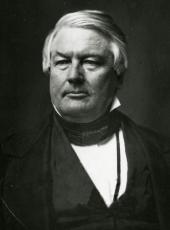|
Millard Fillmore (13) Event Timeline |
|
|
07/10/1850 – 03/04/1853 |
|
|
1850 |
|
|
07/10/1850 |
Becomes President after the sudden death of Zachary Taylor due to gastroenteritis. |
|
07/10/1850 |
|
|
07/20/1850 - 07/23/1850 |
Taylor cabinet resigns. |
|
08/06/1850 |
Formally announces support of compromise with Texas. Recommends that Texas be paid to abandon claims to part of New Mexico. This moment might have been seized as an opportunity to defend the national union and the authority of the national government. |
|
09/09/1850 |
Signs Act (9 Stat 446) proposing the establishment of Texas border boundaries, as well as the establishment of New Mexico as a territory of the United States. The act included a $10 Million payment to Texas for ceding its claims on New Mexico. This was one element of the Compromise of 1850. |
|
09/09/1850 |
Signs Act (9 Stat 452) admitting California into the Union as a state, the second act of the Compromise of 1850. The act recognized and accepted the Constitution submitted by California. |
|
09/09/1850 |
Signs Act (9 Stat 453) establishing Utah as a territory of the United States, the third act of the Compromise of 1850. The issue of slavery in the territory was left in the hands of the territorial legislature. This put an end to a proposal for a State of Deseret. |
|
09/18/1850 |
Signs the Fugitive Slave Act (9 Stat 462), which prohibits individuals from aiding runaway slaves. This was the fourth act of legislature composing the Compromise of 1850. Slave owners, having demonstrated ownership, may “use such reasonable force and restraint as may be necessary. . . to take and remove such fugitive person back to the State or Territory whence he or she may have escaped.” Harboring a fugitive may be punished by fine and imprisonment. Free-state officials are expected to cooperate in returning fugitive slaves. The act gave alleged fugitives no rights to prove their freedom. |
|
09/20/1850 |
Signs Act (9 Stat 467) abolishing slave trade in the District of Columbia, the fifth and final component of the Compromise of 1850. |
|
09/28/1850 |
Names Brigham Young, president of the Mormon Church, Governor of the Territory of Utah. |
|
10/24/1850 |
First National Women’s Rights Convention held by Feminists and Abolitionists in Worcester, Massachusetts. |
|
12/02/1850 |
|
|
12/13/1850 |
|
|
1851 |
|
|
02/15/1851 |
Shadrach Minkins, an escaped slave from Virginia, became the first person arrested in Massachusetts under the Fugitive Slave Act. Minkins was rescued by a group of Black men, and an abolitionist network transported him to Montreal. |
|
02/18/1851 |
Proclamation 56—Calling on citizens to assist in the recapture of a fugitive slave arrested in Boston, Massachusetts. Cites local resistance by force to the enforcement of the Fugitive Slave Act. |
|
02/19/1851 |
|
|
04/25/1851 |
|
|
06/05/1851 |
Harriet Beecher Stowe begins publication of Uncle Tom’s Cabin as a serial appearing in The National Era, an abolitionist newspaper published in the District of Columbia. |
|
07/04/1851 |
Lays cornerstone for extension of Capitol (completed in 1867) |
|
07/25/1851 |
Gold is discovered along the Rogue River in Oregon. |
|
10/22/1851 |
|
|
12/02/1851 |
|
|
12/12/1851 |
Message to the Senate seeks ratification of a treaty of friendship with Costa Rica. |
|
1852 |
|
|
01/13/1852 |
Signs Act (10 Stat 1) which authorizes funds for repairs to the Library of Congress, which had been destroyed by a fire. |
|
06/17/1852 |
Seeks renomination for President from the Whig Party, but is denied when the party nominates General Winfield Scott. |
|
10/24/1852 |
|
|
11/02/1852 |
Election Day; Democratic Party nominee Franklin Pierce is elected President, winning 85.8% of the electoral vote and 50.8% of the popular vote. The Whig Party splits between northern and southern Whigs. |
|
11/25/1852 |
Deliberations begin in Oregon to split up the territory into two separate territories one of which would eventually become Washington state. |
|
12/06/1852 |
Third Annual State of the Union Message. “. . . in California and Oregon there has been no recognition by the Government of the exclusive right of the Indians to any part of the country. They are therefore mere tenants at sufferance, and liable to be driven from place to place at the pleasure of the whites.” |
|
12/07/1852 |
|
|
12/08/1852 |
|
|
1853 |
|
|
02/21/1853 |
Signs Act (10 Stat 160) establishing minting of gold coins worth $3 and reducing the amount of silver contained in standard coins. |
|
02/24/1853 |
Nominates William C. Micou as an Associate Justice of the Supreme Court. Micou becomes the third Supreme Court nominee under President Fillmore to not be acted upon by the Senate. |
|
03/02/1853 |
Signs Act (10 Stat 172) establishing Territorial Government of Washington after separation from Oregon. |
|
03/03/1853 |
Last Whig President. After Fillmore, only Garfield never vetoed an act of Congress. He was nominated for president in 1856 by the “American National” or “Know-Nothing” party and received nearly 22% of the popular vote. |
Last updated: 07/25/2023.
Millard Fillmore, Millard Fillmore Event Timeline Online by Gerhard Peters and John T. Woolley, The American Presidency Project https://www.presidency.ucsb.edu/node/352568

